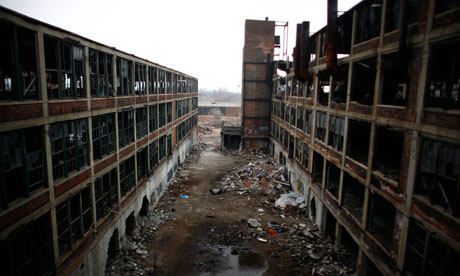How capitalism's great relocation pauperised America's 'middle class'
http://www.guardian.co.uk/commentisfree/2013/jul/09/capitalism-relocation-pauperised-middle-class

The abandoned and decaying manufacturing plant of Packard Motor Car, built in 1907 in Detroit, Michigan, as it has become by 2011. Photograph: Eric Thayer/Reuters
Detroit's struggle with bankruptcy might find some relief, or at least distraction, by presenting its desperate economic and social conditions as a tourist attraction. "Visit Detroit," today's advertisement might begin, "see your region's future here and now: the streets, neighborhoods, abandoned buildings, and the desolation. Scary, yes, but more gripping than any imaginary ghost story."
Detroit, Cleveland, Camden and many other cities display what capitalism left behind after it became profitable for capitalists to relocate and for new capital investments to happen more elsewhere. Capitalism and its driving profit motive first developed in England before spreading to western Europe, north America and then Japan. Over the last two centuries, those areas endured a growing capitalism's mix of horrific working conditions, urban slums, environmental degradation, and cyclical instability. Capitalism also brought economic growth, wealth for a minority, labor unions and other workers' organizations. Writers like Dickens, Zola, Steinbeck, and Gorky saw that capitalism's workings clearly, while those like Marx, Mill and Bakunin understood it critically.
Workers' struggles eventually forced capitalists to pay rising wages, enabling higher living standards for large sections of the working classes (so-called "middle classes"

. Capitalists and their economist spokespersons later rewrote that history to suggest instead that rising wages were blessings intrinsic to the capitalist system. How wrong that was, as I describe below.
Capitalists eventually had to reach beyond their original bases in Europe, North America, and Japan to the rest of the world. Capitalism's growth required enlarging its hinterland from the agricultural regions near the industrial centers where modern capitalism began. That initial hinterland had provided food, raw materials and markets for the commodities flowing increasingly from the growing urban capitalist centers. The hinterland also sent refugees fleeing from declining job opportunities there to work in and crowd those centers.
